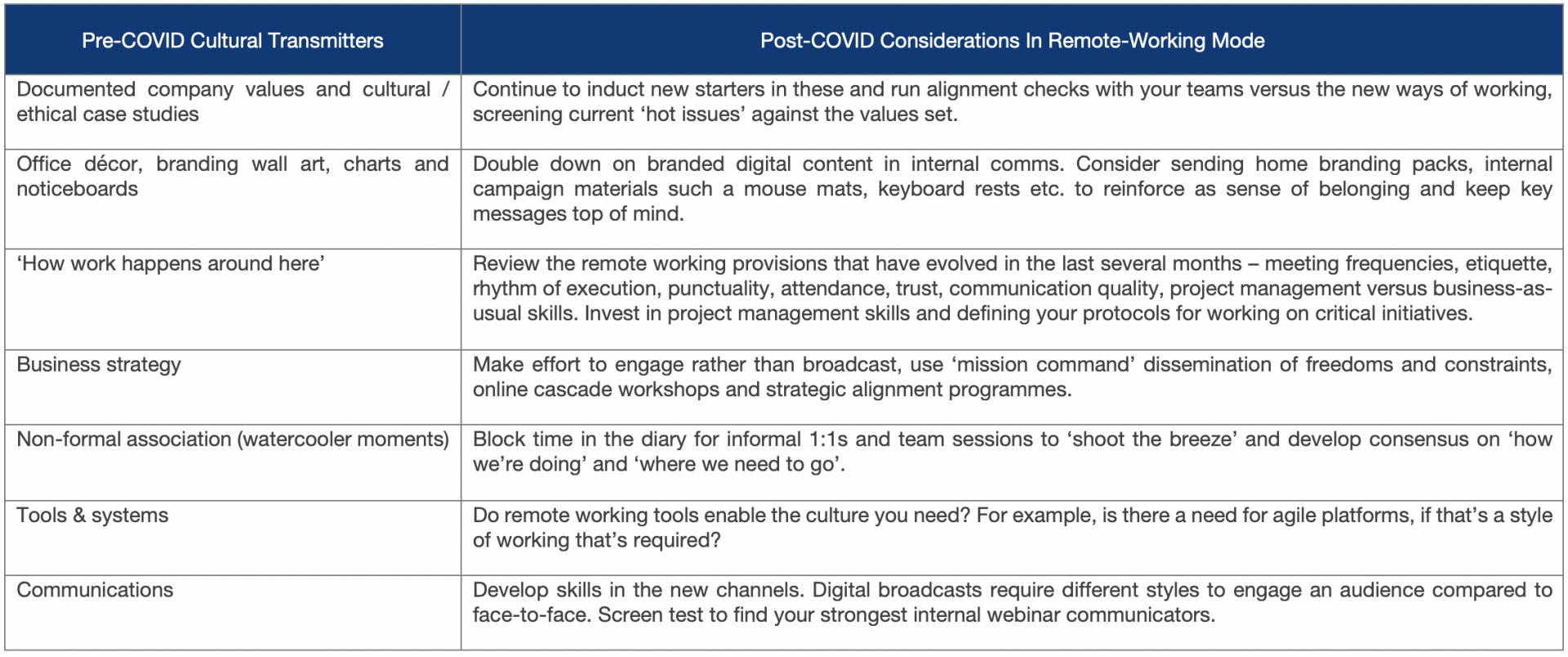What’s Happening To Our Business Culture During COVID?
Culture is acknowledged as a powerful force in shaping what actually happens in your organisation, compared to what is intended. Without a positive culture, many will struggle to find value in their work, collaborate effectively with team members, or align with a company’s values. And given that culture is a socially transmitted set of norms, what is now happening to our organisational cultures through social distancing and remote working?
Culture is an overarching framework that helps us make sense of the world around us – guiding our direction of thinking based on what those around us do, or what we think we should do. In organisations, these cues come indirectly from stories that are told and more directly from our observations of behavioural norms. Many organisations invest heavily behind programmes to drive the culture in a certain direction, a tacit admission of the power of these norms to shape behaviours, frameworks for thinking, and ultimately, business performance.
Indirect Drivers
When Mars Inc, one of the World’s largest private business, was passing from the second generation of family members to the third, they realised the scale of the organisation was now such that propagating the distinct culture that had driven success to date was now much more challenging. The exercise then undertaken was to research the stories that had grown up in the business that guided norms, codify them as case studies, and distil their famous ‘Five Principles’ from them to enshrine a scalable capability. Many other organisations have taken similar steps to guard their cultural ‘secret sauce’.
Direct Drivers
Imagine your first day in a new organisation. What do you notice? How long do people take for their lunch? Where do the senior leaders sit? Are they together as a team, with their own people, or hidden in corner offices? What is on the walls of the offices? Do people arrive on time for meetings? Does someone facilitate? What volume do people talk at in open offices? Do people approach other’s desk unannounced? All these cues start to form our impression of what is expected and how we will have to shape our contribution in our role ahead.
Culture Transmission During COVID
Most businesses have successfully made the adjustment to manage operational processes sustainably in the short term. But cultural transmission is something that operates in the medium term and it’s certainly worth thinking about now that remote working appears to be a factor for some time ahead.
One group that is clearly impacted are new hires; particularly those who are graduate entries and have a lesser set of norms they can bring from similar organisations to get started with. Where will they take their cues from on what is expected in your organisation when they may not have spent a day in your office?
When thinking about the impact of ‘stories’ on your existing workforce, there’s no doubt that the legacy of your organisation’s response to COVID will be a powerful cultural transmitter for many years ahead. How will the history of this chapter be written? What message will it send to generations of your workforce to come? And where are those stories going to be told now people can no longer gather around the water cooler?
Considerations Ahead

Summary
At Skarbek, we’ve found that a systematic approach to examining your cultural transmission channels and putting in place practical steps to ensure continued transmission can be very effective in shaping culture productively during a crisis, when it is more malleable than usual. For example, clients who have invested in sessions in our virtual workshop environment have sent a strong signal that fully collaborative working is still required, despite working remotely. Similarly, end-to-end mapping poorly understood processes and introducing simple project management tools has created visibility and reinforced ‘how work gets done around here’.
Leaders must now consider the implications of how they choose to re-engage the workforce post-crisis and how this may negatively, or positively, affect culture. Choosing to simply revert back to ‘old world’ ways of working could send the wrong signal to employees and potentially upset the balance of trust and empowerment built up during the pandemic. Providing clear rituals around how you manage projects, maintaining a rhythm of touchpoints with employees and keeping employees engaged in collaborative working will help to develop purpose and productivity, but also build strong executional capabilities that are able to adapt to any situation.
Organisations now have the opportunity to create the stories of how you dealt with this crisis that will shape the direction of thought of your people over the next decade. How will your story inform those who come after you?
